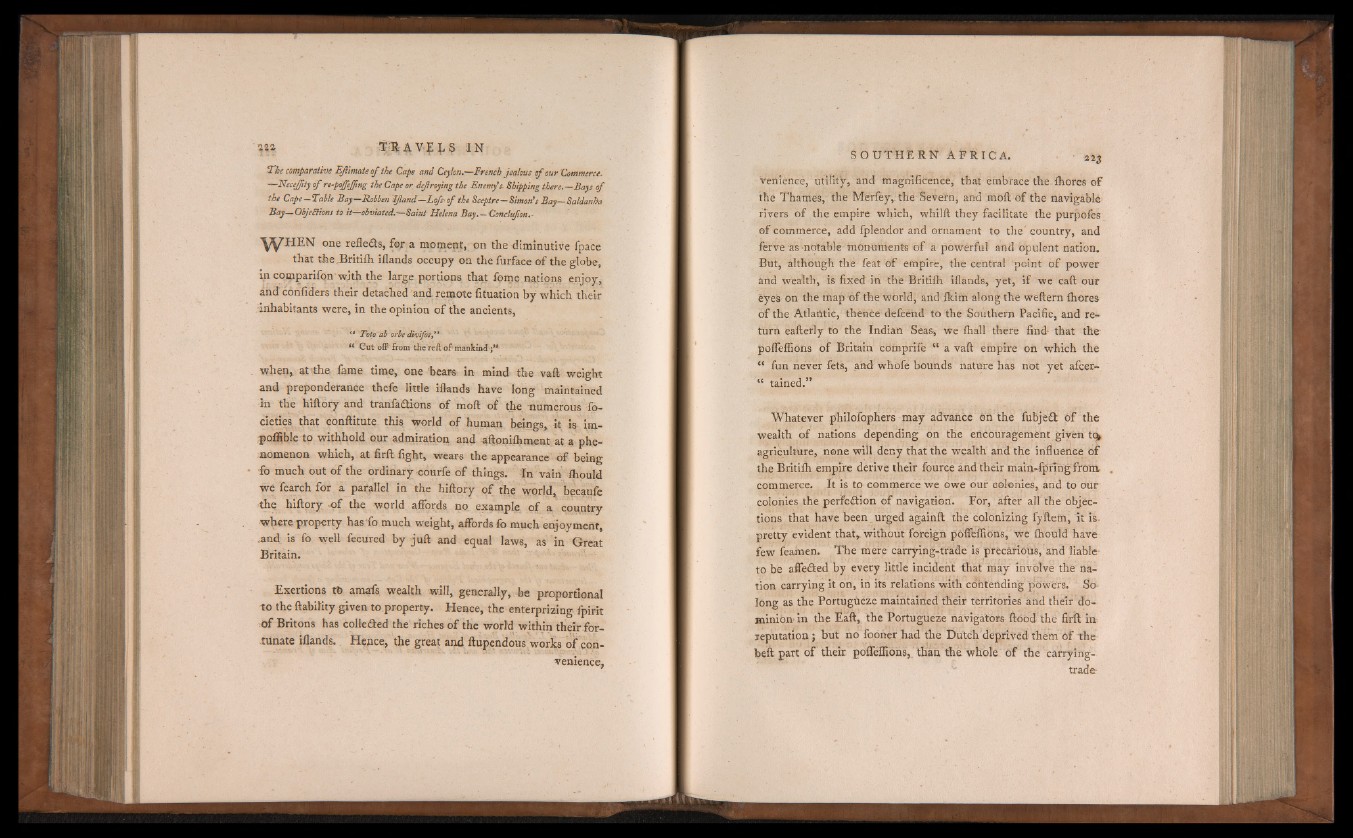
Fhe comparative Efimate of the Cape and Ceylon.— French jealous of our Commerce.
NeceJJity o f re-pojfejfng the Cape or defraying the Enemy's- Shipping there.— Bays of
the Cape—Fable Bay—Robben I/land—Lofs-of the Sceptre— Simon's Bay— Saldanha
Bay— Objections to it— obviated.— Saint Helena Bay.— Conciufon.-
one reflects, f©/ & moment, on the •diminutive ipace
that the JBritiih iflands occupy on the furface of the globe,
in cotnparifqnwith the large portions that fome nations enjoy,
and cónfiders their detached and. remote fituation by which their
inhabitants were, in the opinion of the ancients,
“ Foto ah orbe divifórS*
u Cut off from the reft o f mankind ;M
when, at>the fame time, one bears in mind the vaft weight
and preponderance thefc little iflands have long maintained
in the hiftory and tranfadions of moft of the numerous fo-
cieties. that eonftitute this world of human beings, it is im-
poffible to withhold our admiration and aftonifhment at a phenomenon
which, at firft fight, wears the appearance óf being
fo much out of the ordinary-courfe of things. In vain lhould
we fearch for a parallel in the hiftory of the world, becaufc
•the hiftory -of the world affords no example of a couritry
where property hasfo much weight, affords fo much enjoyment,
.and is fo well fecured by juft and equal laws, as in Great
Britain.
Exertions tte amafs wealth will, generally, be proportional
to the (lability given to property. Hence, the enterprizing fpirit
of Britons has colleded the riches of the world within their fortunate
iflands.. Hence, the great and ftupendous works of convenience,
veriienee, utility, and magnificence, that embrace the fhores of
the Thames, the Merfey, the Severn, and moft of the navigable
rivers of the empire which, whilft they facilitate the purpofes
of commerce, add fplendor and ornament to the'country, and
ferve as notable monuments of a powerful and opulent nation.
But, although the feat of empire, the central point of power
and wealth, is fixed in the Britifh iflands, yet, if we caft our
eyes on the map of the world, and {him along the weftern fhores
of the Atlantic, thence defeend to the Southern Pacific, and return
eafterly to the Indian Seas, we fhall there find that the
poffeflions of Britain comprife “ a vaft empire on which the
“ fun never fets, and whofe bounds nature has not yet afcer-
“ tained.”
Whatever philofophers may advance on the fubjed of the
wealth of nations depending on the encouragement given tq>
agriculture, none will deny that the wealth and the influence of
the Britifh empire derive their fource and their main-fpring from,
commerce. It is to commerce we owe our colonies, and to our
colonies the perfedion of navigation. For, after all the objections
that have been, urged againft the colonizing fyftern, it is.
pretty evident that,, without foreign pdffeflions,' we fhould have
few feamen. The mere carrying-trade is precaiioius, and liable
to be affeded by every little incident that may involve the nation
carrying it on, in its relations with contending powers. So
long as the PortugUCze maintained their territories and their dominion*
in the Eaft, the Portugueze navigators flood the firift in
reputation ; but no fooner had the Dutch deprived them Of the
beft part of their pofleffions, than the. whole of the carryingtrade